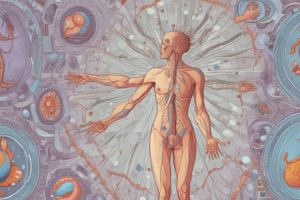Podcast
Questions and Answers
Which of the following is a characteristic of the nonspecific defense system?
Which of the following is a characteristic of the nonspecific defense system?
- It has a memory.
- It involves B cells.
- It is antigen-specific.
- It responds immediately to protect the body from foreign material. (correct)
Which cells are involved in both nonspecific and specific lines of defense?
Which cells are involved in both nonspecific and specific lines of defense?
- Macrophages (correct)
- Dendritic Cells
- Natural Killer Cells
- Neutrophils
What is the primary function of natural killer (NK) cells?
What is the primary function of natural killer (NK) cells?
- Producing histamines
- Secreting antibodies
- Engulfing foreign material
- Lysing and killing cancer cells and virus-infected cells (correct)
Which of the following is a characteristic of the specific defense system?
Which of the following is a characteristic of the specific defense system?
Antigens that can provoke an adaptive immune response are known as:
Antigens that can provoke an adaptive immune response are known as:
What type of immunity is conferred when antibodies are obtained from another source?
What type of immunity is conferred when antibodies are obtained from another source?
Which cells become immunocompetent in the thymus?
Which cells become immunocompetent in the thymus?
Which part of the immune system recognizes and mounts a stronger attack on previously encountered pathogens?
Which part of the immune system recognizes and mounts a stronger attack on previously encountered pathogens?
The secondary immune response is characterized by:
The secondary immune response is characterized by:
Which of the following is NOT a cardinal sign of the inflammatory response?
Which of the following is NOT a cardinal sign of the inflammatory response?
Which of the following is NOT part of the first line of defense in the immune system?
Which of the following is NOT part of the first line of defense in the immune system?
Which cells are primarily responsible for the production of antibodies?
Which cells are primarily responsible for the production of antibodies?
Which immune response is responsible for targeting virus-infected cells and cancer cells?
Which immune response is responsible for targeting virus-infected cells and cancer cells?
What type of cell is responsible for engulfing and digesting foreign material in the body?
What type of cell is responsible for engulfing and digesting foreign material in the body?
Which of the following statements about self-antigens is true?
Which of the following statements about self-antigens is true?
The nonspecific defense system has memory and responds immediately to protect the body from foreign material.
The nonspecific defense system has memory and responds immediately to protect the body from foreign material.
Macrophages are involved in both the second line of defense and the specific immune response.
Macrophages are involved in both the second line of defense and the specific immune response.
Natural killer (NK) cells can destroy virus-infected cells and cancer cells.
Natural killer (NK) cells can destroy virus-infected cells and cancer cells.
The specific defense system lacks memory and acts against all pathogens in the same way.
The specific defense system lacks memory and acts against all pathogens in the same way.
All antigens are immunogens capable of provoking an adaptive immune response.
All antigens are immunogens capable of provoking an adaptive immune response.
Passive immunity involves the production of antibodies by the individual's own immune system.
Passive immunity involves the production of antibodies by the individual's own immune system.
B lymphocytes become immunocompetent in the bone marrow.
B lymphocytes become immunocompetent in the bone marrow.
The secondary immune response is typically weaker and shorter than the primary response.
The secondary immune response is typically weaker and shorter than the primary response.
Inflammatory response does not prevent the spread of damaging agents.
Inflammatory response does not prevent the spread of damaging agents.
Vaginal secretions are acidic to inhibit bacterial growth.
Vaginal secretions are acidic to inhibit bacterial growth.
Phagocytosis is the process by which phagocytes engulf and digest foreign material.
Phagocytosis is the process by which phagocytes engulf and digest foreign material.
The humoral immune response involves B cells producing chemicals for defense.
The humoral immune response involves B cells producing chemicals for defense.
The inflammatory response results in redness, heat, swelling, and pain.
The inflammatory response results in redness, heat, swelling, and pain.
The specific defense system is antigen-specific and systemic.
The specific defense system is antigen-specific and systemic.
Memory cells play a crucial role in the secondary immune response.
Memory cells play a crucial role in the secondary immune response.
Flashcards are hidden until you start studying
Study Notes
Characteristic of Nonspecific Defense System
- Responds immediately to protect the body from foreign material
- No memory
Cells Involved in Both Nonspecific and Specific Lines of Defense
- Macrophages
- Dendritic Cells
Function of Natural Killer (NK) Cells
- Lysing and killing cancer cells and virus-infected cells
Characteristics of Specific Defense System
- Has a slow response and memory
- Involves antigen-specific responses
Antigens and Immunogens
- Antigens that can provoke an adaptive immune response are known as immunogens
- Not all antigens are immunogens
Types of Immunity
- Active immunity: conferred through production of antibodies by the individual's own immune system
- Passive immunity: conferred through antibodies obtained from another source
Development of Immunocompetent Cells
- B lymphocytes become immunocompetent in the bone marrow
- T lymphocytes become immunocompetent in the thymus
Immune Response to Previously Encountered Pathogens
- Specific defense system recognizes and mounts a stronger attack on previously encountered pathogens
Secondary Immune Response
- Characterized by a stronger and longer-lasting response
- Involves memory cells
Inflammatory Response
- Characterized by: redness, heat, swelling, and pain
- Prevents the spread of damaging agents
- Itching is not a cardinal sign of inflammation
First Line of Defense
- Skin
- Mucous membranes
- Stomach mucosa (not part of the first line of defense)
- Phagocytes are not part of the first line of defense
Antibody Production
- B lymphocytes are primarily responsible for the production of antibodies
Immune Response to Virus-Infected Cells and Cancer Cells
- Cellular immunity is responsible for targeting virus-infected cells and cancer cells
Phagocytosis
- Phagocytes are responsible for engulfing and digesting foreign material in the body
Self-Antigens
- Surface proteins that do not normally trigger an immune response in their own body
Studying That Suits You
Use AI to generate personalized quizzes and flashcards to suit your learning preferences.




